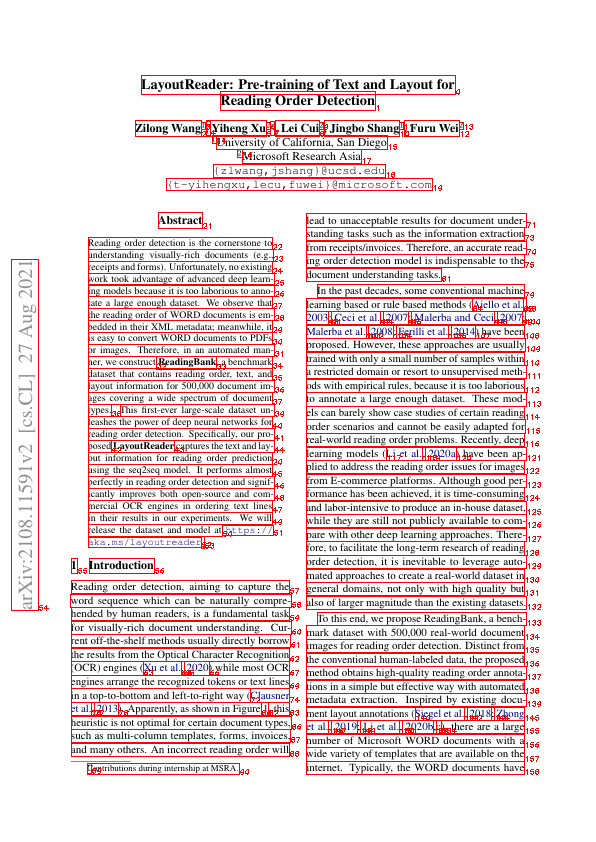The original LayoutReader is published by Microsoft Research. It is based on LayoutLM, and use a seq2seq architecture to predict the reading order of the words in a document. There are several problems with the original repo:
- Because it doesn't use
transformers, there are lots of experiments in the code, and the code is not well-organized. It's hard to train and deploy. seq2seqis too slow in production, I want to get the all predictions in one pass.- The pre-trained model's input is English word-level, but it's not the real case. The real inputs should be the spans extracted by PDF parser or OCR.
- I want a multilingual model. I notice only use the bbox is only a little bit worse than bbox+text, so I want to train a model only use bbox, ignore the text.
- Refactor the codes, use
LayoutLMv3ForTokenClassificationoftransformersto train and eval. - Offer a script turn the original word-level dataset into span-level dataset.
- Implement a better post-processor to avoid duplicate predictions.
- Release a pre-trained model fine-tuned from layoutlmv3-large
from transformers import LayoutLMv3ForTokenClassification
from v3.helpers import prepare_inputs, boxes2inputs, parse_logits
model = LayoutLMv3ForTokenClassification.from_pretrained("hantian/layoutreader")
# list of [left, top, right, bottom], bboxes of spans, should be range from 0 to 1000
boxes = [[...], ...]
inputs = boxes2inputs(boxes)
inputs = prepare_inputs(inputs, model)
logits = model(**inputs).logits.cpu().squeeze(0)
orders = parse_logits(logits, len(boxes))
print(orders)
# [0, 1, 2, ...]Or you can python main.py to serve the model.
The original dataset can download from ReadingBank. More details can be found in the original repo.
unzip ReadingBank.zip
python tools.py ./train/ train.jsonl.gz
python tools.py ./dev/ dev.jsonl.gz
python tools.py ./test/ test.jsonl.gz --src-shuffle-rate=0
python tools.py ./test/ test_shuf.jsonl.gz --src-shuffle-rate=1The core codes are in ./v3 folder. The train.sh and eval.py are the entrypoints.
bash train.sh
python eval.py ../test.jsonl.gz hantian/layoutreader
python eval.py ../test_shuf.jsonl.gz hantian/layoutreadershufmeans whether the input order is shuffled.BlEU Idxis the BLEU score of predicted tokens' orders.BLEU Textis the BLEU score of final merged text.
I only train the layout only model. And test on the span-level dataset. So the Heuristic Method result is quite different from the original word-level result. I mainly focus on the BLEU Text, it's only a bit lower than the original word-level result. But the speed is much faster.
| Method | shuf | BLEU Idx | BLEU Text |
|---|---|---|---|
| Heuristic Method | no | 44.4 | 70.7 |
| LayoutReader (layout only) | no | 94.9 | 97.5 |
| LayoutReader (layout only) | yes | 94.8 | 97.4 |
The layout only model is trained by myself using the original codes, and the public model is the pre-trained model. The layout only is nearly as good as the public model, and the shuf only has a little effect on the results.
Only test the first part of test dataset. Because it's too slow...
| Method | shuf | BLEU Idx | BLEU Text |
|---|---|---|---|
| Heuristic Method | no | 78.3 | 79.4 |
| LayoutReader (layout only) | no | 98.0 | 98.2 |
| LayoutReader (layout only) | yes | 97.8 | 98.0 |
| LayoutReader (public model) | no | 98.0 | 98.3 |
- Evaluation results of the LayoutReader on the reading order detection task, where the source-side of training/testing data is in the left-to-right and top-to-bottom order
| Method | Encoder | BLEU | ARD |
|---|---|---|---|
| Heuristic Method | - | 0.6972 | 8.46 |
| LayoutReader (layout only) | LayoutLM (layout only) | 0.9732 | 2.31 |
| LayoutReader | LayoutLM | 0.9819 | 1.75 |
- Input order study with left-to-right and top-to-bottom inputs in evaluation, where r is the proportion of shuffled samples in training.
| Method | BLEU | BLEU | BLEU | ARD | ARD | ARD |
|---|---|---|---|---|---|---|
| r=100% | r=50% | r=0% | r=100% | r=50% | r=0% | |
| LayoutReader (layout only) | 0.9701 | 0.9729 | 0.9732 | 2.85 | 2.61 | 2.31 |
| LayoutReader | 0.9765 | 0.9788 | 0.9819 | 2.50 | 2.24 | 1.75 |
- Input order study with token-shuffled inputs in evaluation, where r is the proportion of shuffled samples in training.
| Method | BLEU | BLEU | BLEU | ARD | ARD | ARD |
|---|---|---|---|---|---|---|
| r=100% | r=50% | r=0% | r=100% | r=50% | r=0% | |
| LayoutReader (layout only) | 0.9718 | 0.9714 | 0.1331 | 2.72 | 2.82 | 105.40 |
| LayoutReader | 0.9772 | 0.9770 | 0.1783 | 2.48 | 2.46 | 72.94 |
If this model helps you, please cite it.
@software{Pang_Faster_LayoutReader_based_2024,
author = {Pang, Hantian},
month = feb,
title = {{Faster LayoutReader based on LayoutLMv3}},
url = {https://github.com/ppaanngggg/layoutreader},
version = {1.0.0},
year = {2024}
}
